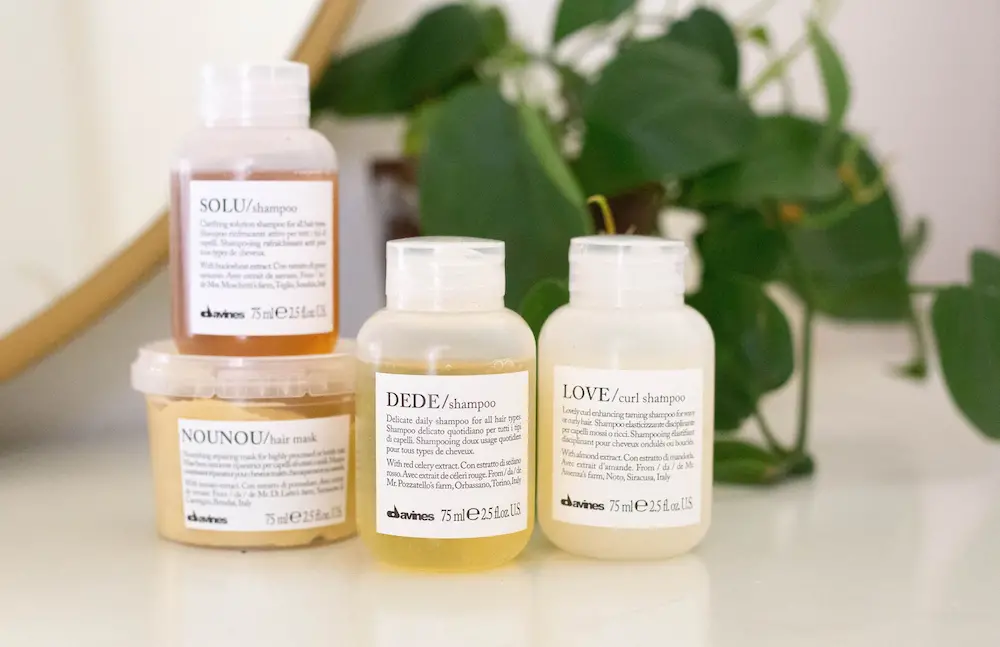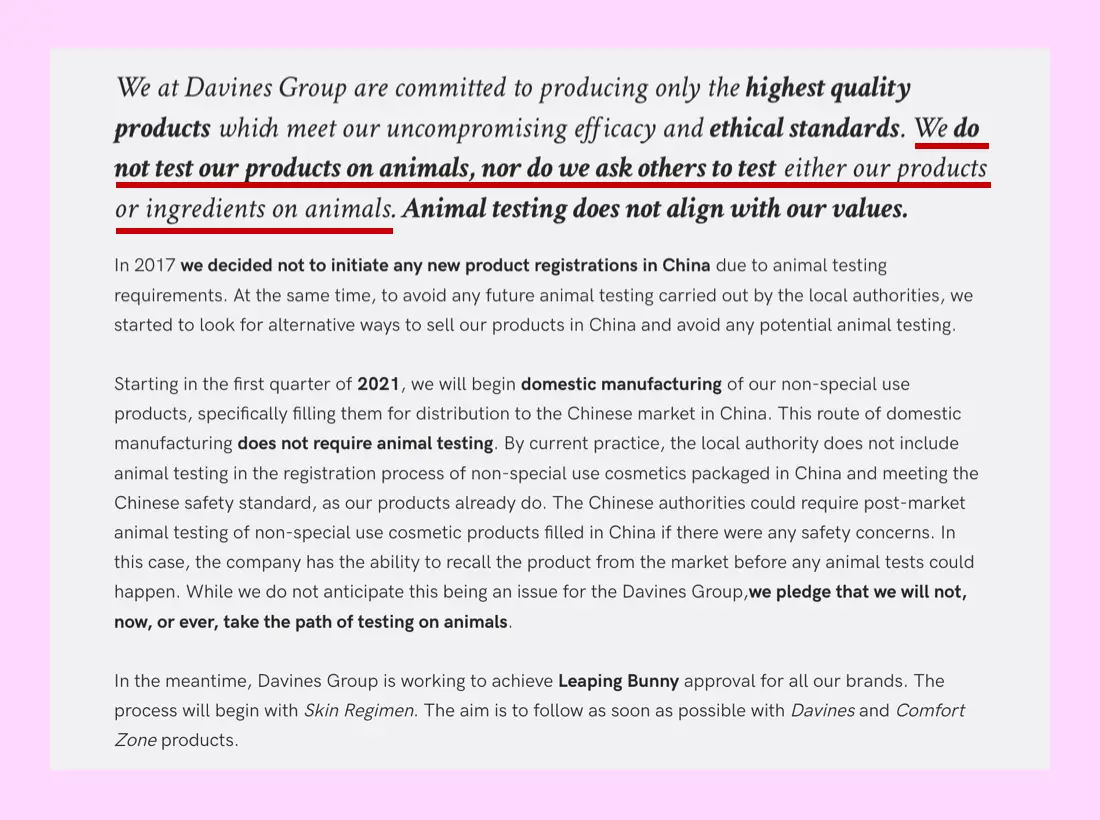Davines is all about creating high-quality hair care products that don’t harm the planet. For a brand that prides itself in sustainable beauty, why does it have sketchy, cruelty-free, vegan policies?
Davines’ cruelty-free status is in the grey area. While it doesn't conduct animal testing, it has a complicated distribution policy in China, where the law requires animal testing on cosmetics entering the country. Davines has products free of animal-derived ingredients, but they cannot be considered vegan.
Davines has a lot going for it! From the minute you pick up one of its apothecary-styled bottles – you immediately know that the brand is all about sustainability, biodiversity, and social good.
This family-run Italian brand has the planet in mind with every product packaging or distribution decision they make.
Plus, since each primary ingredient is sourced locally from Parma – you get a bit of Italy in every product you buy.
But we want to know if you can confidently spend your money knowing animal welfare is being considered too.
So please put on the brakes before you take out the credit card. Davines has a seriously complicated history with its cruelty-free policies that may leave you skeptical and confused.
Is Davines Cruelty-Free and Vegan?
Davines is Not Guaranteed Cruelty-Free
It does not:
But, it does technically:
Davines distributes and sells its products to mainland China – but it’s not as simple as you might think.
Its cruelty-free status is in the grey area because it uses a loophole in Chinese law to exempt them from animal testing.
Sounds promising, but –
Any product safety issues would mean they could still be subject to animal testing.
Until now, there’s been no proof that this has happened or will happen.
So, yay… we guess?
Luckily Davines is 100% owned by its founding Italian family, so there’s no pesky parent company to confuse the situation further.
This brings us to the next point:
Davines is Not Vegan
Although Davines claims to have vegetarian and vegan ranges, it’s hard to consider any of its products free of animal-derived ingredients as “vegan” because it’s not 100% cruelty-free.
Does it have products that are free of animal-derived ingredients? Yes.
Are these products considered holistically vegan? Not in our opinion.
The brand doesn’t clearly mark which products are “vegetarian” or “vegan” either on its website.
However, it claims to only use three animal-derived ingredients in the following products:
If you're interested in finding vegan brand alternatives – keep reading or click on this link: Davines vegan alternatives.
Animal Testing Policy and History
This is where things get complicated.
Until 2017, Davines was actively selling its products in mainland China where animal testing is required by law.
They apparently had a sudden change of heart. They decided to stop all product registrations in China precisely because of their animal testing policies.
If this was the end of the story, it would be excellent news. Companies actively making positive changes to better their values is always a step in the right direction.
Unfortunately, China began allowing the selling of special-use products with domestic manufacturing in 2021.
This route does not require animal testing unless a safety concern arises.
This means that the certainty of whether this loophole is truly cruelty-free or not depends on how much you trust a million-dollar company to do the right thing.
While Davines can legally recall the product before Chinese authorities can begin any testing – how can they genuinely guarantee that they will?
There just isn’t enough proof right now, and that leaves us skeptical.
Cruelty-Free Status in 2022
Here is a screenshot of Davines’ official statement regarding its cruelty-free policies and vegan products, taken from its website:
Certification
Davines has no cruelty-free certification.
And when a multi-million dollar brand that could easily be certified and claims to make “cruelty-free products” without any backing – we have to ask ourselves why?
Ideally, all brands that consider themselves cruelty-free should be Leaping Bunny certified. And while Davines claims to be working on getting Leaping Bunny approval, it hasn’t happened yet.
While you might know PETA very well – it surprisingly doesn't hold the strictest cruelty-free regulations. Leaping Bunny certification is ideal because it proves that:
Unfortunately, you won’t find any bunny stamps on the back of these product bottles.
But if you find a cruelty-free brand with one, it’s a good sign – just don't let the image fool you. A lot of brands are using fake logos to mislead consumers.
Do your homework and see which products are genuinely cruelty-free first. This article will help you: Which Cruelty-Free Logos Can You Trust?
Is Davines Sold Where Animal Testing is Required By Law?
Yes, Davines distributes its products in China, where animal testing on cosmetics is required as products arrive at the border.
The loophole Davines is using is relatively new and creates a grey area of unexplored territory for many cosmetic brands wanting to distribute to China.
This makes it difficult to guarantee if the brand can truly be 100% cruelty-free or not at this stage.
China has a shocking track record. It is the country with the most animal testing globally, with over 20 million animals used per year.
However, if you live in China or are concerned about its cruel beauty policies, there are a couple of loopholes.
Here's how to find cruelty-free cosmetics in China: Are Cosmetics Made in China Cruelty-Free?
What Davines Products Are Vegan?
The majority of Davines’ products are free from animal-derived ingredients.
Currently, they only have 4 products that are definitely not “vegan”:
Since the products are not marked clearly on its website – at least you now know what to look out for!
Of course, you also need to decide whether these products are holistically vegan because of their complicated cruelty-free policies. Innocent until proven guilty, right?
To save you some time, here are some of Davines most popular and award-winning products to choose from:
Unfortunately, Davines does not have a dedicated page for its vegan products.
However, you can email customer service, and they will send you an extensive list of exactly what you want to know.
You can also scroll through Davines’ website and see which products are vegan once you've selected them.Vegan Alternatives to Davines
At face value, Davines has some great products. While not all of them are free of animal-derived ingredients – the vast majority are.
But this is not where the problem lies. They insist on distributing to China after changing to a 100% cruelty-free policy!
This is a red flag, in our opinion – loophole or not.
If you will not support a brand that isn’t entirely vegan, or you’re as skeptical of this new loophole as we are – Davines might not be your first choice.
Here are some nature-inspired skincare brands within the same price range that are 100% vegan and cruelty-free.
Is Davines Natural and Organic?
While Davines uses plenty of naturally derived ingredients and even some ingredients from organic farms, they do not label themselves as natural or organic.
The main claim is they mix natural origin ingredients with clean synthetics to guarantee safety and performance.
In the product description of each product, you will find the percentage of natural origin ingredients so you can be sure what you’re buying.
Clean vs. Natural Ingredients
The term "natural" is not regulated for cosmetics and skincare. In other words, it doesn't hold one specific meaning.
Usually, it means a product is free of certain more toxic synthetic ingredients, including parabens, phthalates, sulfates, and more. But people also interpret "natural" to mean ingredients of immediate plant origin.
Here's the thing: "natural" is not necessarily good. Just because an ingredient is natural (take egg whites, for example) doesn't mean you should rub it on your skin and risk a salmonella infection!
All products use a certain amount of synthetic ingredients in their formulas. Davines is no exception – but it does choose to use better or clean synthetics.
If a synthetic ingredient is "clean," it means it is safe and non-toxic for us. Its purpose is to preserve the stability of a beauty formulation.
A few naturally-derived ingredients Davines uses to enhance its cosmetics include:
Does Davines Use Safe Ingredients?
According to Skin Safe, Davines has a 73 - 100% allergen-free ranking for each product.
All Davines products are paraben and sulfate free. The brand also avoids allergens such as common preservatives, gluten, coconut, MCI/MI, nickel, Propylene, glycol, soy, and irritants.
Reading the ingredient list is crucial because Davines is not 100% hypoallergenic or non-comedogenic, and they do not claim to be.
Davines has a very transparent ingredient policy. Their ingredient glossary is handy.
The EU/UK Have Stricter Ingredient Regulations
We don’t want to scare you, but you HAVE to read up on any product’s ingredient list before you make a purchase – especially if you live within the United States. The reason why will shock you.
The FDA has only banned or restricted 11 harmful chemicals from cosmetics within the country. Europe and the UK, on the other hand, have banned 1,328!
Given that Davines is an EU-based brand with strict ingredient policies – you don't need to worry too much.
Luckily, Davines sets a great example of what true clean beauty is meant to be. You shouldn’t have to worry about any serious hidden nasties in its products.
But for good measure, you should always avoid these hair care ingredients:
Are Cruelty-Free Ingredients Safe?
If you’re worried about how safe it is to use cosmetics not tested on animals – please relax and take a sigh of relief.
There is no reason why cruelty-free products shouldn’t be as safe as anything tested on animals.
Not only is it easy to test ingredients without using animals altogether, but there are so many pre-approved ingredients you can use to make cosmetics that there is no need.
If you’re interested, here’s more on the subject: Are Cruelty-Free Cosmetics Safe?
Is Davines Sustainable and Ethical?
Davines does not disappoint when it comes to its sustainability initiatives. Seriously – they aren’t kidding when they say that the brand is all about making beauty sustainable.
The values and initiatives tie in with the company values; better yet, they have proof to back them up. It’s always exciting to see brands with thorough and up-to-date sustainability reports.
You can read their full 2021/2022 sustainability report, but with 45 pages, here are a few highlights.
As it stands, the brand:
Some of the ethical causes Davines supports include:
Last year, they allocated €1,019,807 to donations and sponsorships for social and environmental purposes.
It's no secret that the world has a huge waste problem, and cosmetic brands only make it worse by using unsustainable packaging and harmful ingredients.
Some of the ways Davines is taking strong environmental accountability is by:
Final Thoughts
Davines is an undeniably well-developed hair care brand that sets an excellent example for the level of transparency and sustainability that we should want from all brands.
We appreciate that it has a transparent supply chain and is open to the public about its testing, purchasing, and distribution policies.
Of course, they aren’t at the gold standard we want, but they are SO close!
The brand is not 100% vegan – it might not be the best choice for activists who go the extra mile. And their cruelty-free policies are frustrating, to say the least.
We can appreciate them taking a stand against animal testing in China. Still, instead of completely withdrawing from the market – they are attempting to use loopholes that do not give us the peace of mind we want.
They really want their cake and eat it too, which puts a strain on an otherwise great brand.
Of course, we can’t assume they are another evil corporation that will lie and not stick to their pledge. But how much can we really trust them?


